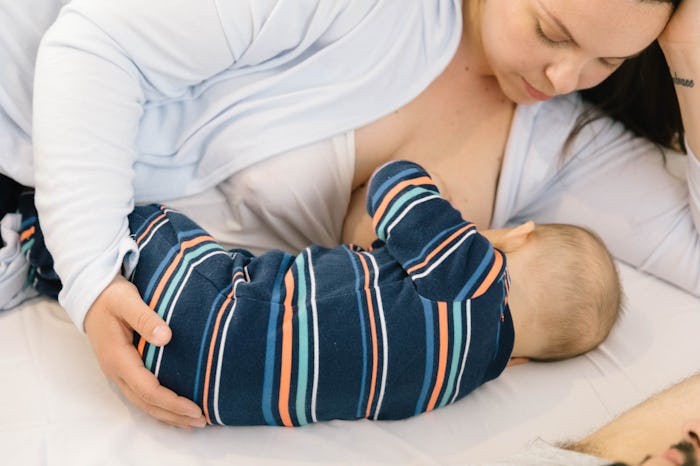Life
Apparently Your Baby's Night Feedings & Your Period Are Connected, Experts Say
When you're breastfeeding, trying to track your menstrual cycle can become quite complicated, and it takes a while to get back to a regular pattern. When you're searching for answers as to why your cycle keeps ping ponging around the calendar like it's trying to reach a new high score, you begin to wonder if outside influences like parental stress, or your baby's feeding habits, could be affecting your regularity. For instance, you noticed that your period is later than usual, just as your baby starts night feeding again. So can baby's sleep schedule affect your period?
It's no secret that when your baby starts sleeping soundly through the night, and you begin to breastfeed less and less, your period returns. The temporary lack of a menstrual cycle was due to a phenomenon known as "lactational amenorrhea." As per the department of Health and Human Services (HHS), lactational amenorrhea is what happens during breastfeeding when "the baby naturally puts pressure on the mother's nipple. The pressure on the nipple sends a message to the mother’s body to produce a hormone that prevents egg production (ovulation) in the mother."
When you don't ovulate, you don't have anything to produce a period, so it makes sense to think that rebound feedings would cause something similar to occur.
I contacted Courtney Martin, DO, obstetrician-gynecologist and medical director of maternity services at Loma Linda University Children’s Hospital, and asked her what could be happening. She tells Romper that your wonky cycle is unlikely to be related to your baby's sleep regression. “Sleep regression in an infant doesn’t cause changes to the menstrual cycle, but if you are exclusively breastfeeding for the first six months, the majority of women will not have a cycle," she says.
If you're wondering where Aunt Flo is hiding at four months postpartum — lucky you — she's probably just around the corner. But Dr. Martin says, "As long as you are breastfeeding or pumping every three hours, not supplementing formulas and have not had a period, you should experience lactational amenorrhea.” That means that if you want to keep away your period for a while longer, you can pretty much kiss sleep goodbye, as you'll need to be pumping or breastfeeding around the clock to continue to ward off ovulation with the production of the hormones that block ovulation. It's a trade off; you either get to sleep through the night, or your period returns.
Interestingly, there are some experts in the field of breastfeeding and sleep who believe that the inverse of this scenario may be the actual culprit. They posit that your menstrual cycle might be the cause of your child's sleep regression. The experts at The Baby Sleep Site wrote that when your period returns, you might not produce as much milk, and that it might taste slightly different than before you regained your cycle. That could cause the baby's nursing habits to change.
They noted that your baby might be hungrier than normal for a while, and that means they will want to breastfeed more often, even in the middle of the night, or at nap time, because hungry babies are not as well-rested, and wake more frequently.
It appears as though there is a reciprocal nature between your cycle and your baby's sleeping habits, just not necessarily in the direction you might think. Breast milk is an amazing, changing food that has the ability to impact both mother and child in ways that are often difficult to quantify.
If you're noticing a severe alteration in your baby's sleep, your cycle, or your milk production, talk to your OB-GYN or pediatrician — they really are there to help.
